Phil 347 week 2 quiz - Study guides, Revision notes & Summaries
Looking for the best study guides, study notes and summaries about Phil 347 week 2 quiz? On this page you'll find 67 study documents about Phil 347 week 2 quiz.
Page 4 out of 67 results
Sort by
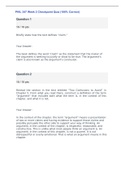
-
PHIL 347 Week 2 Checkpoint Quiz (100% Correct)
- Exam (elaborations) • 5 pages • 2022
-
- £10.55
- 3x sold
- + learn more
PHIL 347 Week 2 Checkpoint Quiz (100% Correct) Briefly state how the text defines “claim.” Your Answer: The book defines the word "claim" as the statement that the maker of the argument is seeking to justify or show to be true. The argument's claim is also known as the argument's conclusion. Reread the section in the text entitled “Two Confusions to Avoid” in Chapter 5. From what you read there, construct a definition of the term “argument” that...
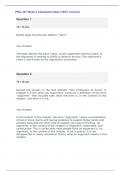
-
PHIL 347 Week 2 Checkpoint Quiz (100% Correct)
- Exam (elaborations) • 5 pages • 2024
-
- £8.19
- + learn more
PHIL 347 Week 2 Checkpoint Quiz (100% Correct) Briefly state how the text defines “claim.” Your Answer: The book defines the word "claim" as the statement that the maker of the argument is seeking to justify or show to be true. The argument's claim is also known as the argument's conclusion. Reread the section in the text entitled “Two Confusions to Avoid” in Chapter 5. From what you read there, construct a definition of the term “argument” that...
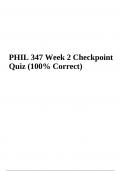
-
PHIL 347 Week 2 Checkpoint Questions | 100% Verified.
- Exam (elaborations) • 4 pages • 2023
- Available in package deal
-
- £13.39
- + learn more
PHIL 347 Week 2 Checkpoint Questions | 100% Correct.
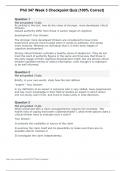
-
Phil 347 Week 3 Checkpoint Quiz (100% Correct)
- Exam (elaborations) • 5 pages • 2024
-
- £8.19
- + learn more
Phil 347 Week 3 Checkpoint Quiz (100% Correct) According to the text, how do the views of stronger, more developed critical thinkers toward authority differ from those in earlier stages of cognitive development? Your Answer: The stronger more developed thinkers are considered to have more experience and are more trusted when it comes to authority, this shows more maturity. Whereas an individual that is in their early stages of cognitive development. Strong critical thinkers cultivate ...

-
PHIL 347 Week 2 Checkpoint Quiz (100% Correct)
- Exam (elaborations) • 5 pages • 2022
-
- £9.66
- + learn more
PHIL 347 Week 2 Checkpoint Quiz (100% Correct) Briefly state how the text defines “claim.” Your Answer: The book defines the word "claim" as the statement that the maker of the argument is seeking to justify or show to be true. The argument's claim is also known as the argument's conclusion.
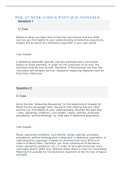
-
PHIL 347 WEEK 4 CHECK POINT QUIZ ANSWERED
- Exam (elaborations) • 11 pages • 2022
-
- £8.11
- + learn more
PHIL 347 WEEK 4 CHECK POINT QUIZ ANSWERED Based on what you have read in the text, the lecture, and any other sources you find helpful to your understanding of deductive arguments, explain the structure of a deductive argument in your own words. Your Answer: A deductive argument typically has two premises and a conclusion based on those premises. In order for the conclusion to be true, the premises must be true as well. Therefore, if the premises are true, the conclusion will cer...
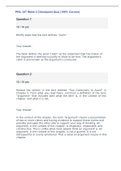
-
PHIL 347 Week 2 Checkpoint Quiz (100% Correct)
- Exam (elaborations) • 5 pages • 2022
-
- £6.49
- + learn more
PHIL 347 Week 2 Checkpoint Quiz (100% Correct) Briefly state how the text defines “claim.” Your Answer: The book defines the word "claim" as the statement that the maker of the argument is seeking to justify or show to be true. The argument's claim is also known as the argument's conclusion. Reread the section in the text entitled “Two Confusions to Avoid” in Chapter 5. From what you read there, construct a definition of the term “argument” that...
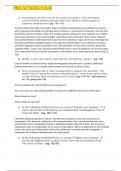
-
PHIL_347N___Wk_3_Checkpoint_Quiz
- Exam (elaborations) • 4 pages • 2023
- Available in package deal
-
- £8.52
- + learn more
PHIL 347 WEEK 3 QUIZ 1. According to the text, how do the views of stronger, more developed critical thinkers toward authority differ from those in earlier stages of cognitive development? (pg. 116- 117) Our text explains that folks in the earlier stages of cognitive development view authority as someone who is powerful and capable of controlling others' behavior, or as someone trustworthy, who can offer good advice (Facione & Gittens, 2016). For example, parents and teachers have authori...

-
PHIL 347 Week 6 Checkpoint Quiz Results New Solution With All Correct Questions and Answers
- Exam (elaborations) • 5 pages • 2022
- Available in package deal
-
- £9.33
- + learn more
PHIL 347 Week 6 Checkpoint Quiz Results New Solution With All Correct Questions and Answers Week 6 Checkpoint Quiz Results for Nursing Student Score for this quiz: 100 out of 100 Submitted Sep 13 at 6:20pm This attempt took 152 minutes Question 1 What are the three fundamental reasoning strategies listed in the text? Your Answer: The three fundamental reasoning strategies are 1) comparative reasoning 2) ideological reasoning 3) empirical reasoning Question 2 What ...

-
PHIL 347 WEEK 2 CHECKPOINT QUIZ. 100% CORRECT QUESTION AND ANSWER
- Exam (elaborations) • 3 pages • 2022
- Available in package deal
-
- £9.33
- + learn more
PHIL 347 WEEK 2 CHECKPOINT QUIZ. 100% CORRECT QUESTION AND ANSWER PHIL 347 Week 2 Checkpoint Quiz Score for this quiz: 50 out of 50 Submitted May 17 at 12:42pm This attempt took 131 minutes. Question 1 10 / 10 pts Briefly state how the text defines “claim.” Your Answer: A claim is intended to support the "reason". A claim is the expression to make an argument in a process to give one or more "reasons" in support of the claim. The term claim refers to the s...

£5.50 for your revision notes multiplied by 100 fellow students... Do the math: that's a lot of money! Don't be a thief of your own wallet and start uploading yours now. Discover all about earning on Stuvia


